
The blue dacnis or turquoise honeycreeper is a small passerine bird. This member of the tanager family is found from Nicaragua to Panama, on Trinidad, and in South America south to Bolivia and northern Argentina. It is widespread and often common, especially in parts of its South American range.

The tit-like dacnis is a small neotropical passerine bird found in southern Ecuador and Peru. In Spanish, it is known as Azulito Altoandino. It is found in Andean montane scrub forests from 3000 m to 4600 m elevation.

Berlepsch's tinamou is a type of ground bird found in moist forest in northwestern Colombia and northwestern Ecuador.

The plain-mantled tit-spinetail is a small passerine bird of South America in the Furnariinae subfamily of the ovenbird family Furnariidae. It is found in Argentina, Bolivia, Chile, and Peru.

The Esmeraldas woodstar is a rare, neotropical species of hummingbird in the family Trochilidae. There are six different species in the woodstar genus. Most of them are poorly studied due to their small size, extremely similar resemblance to each other, and rarity. Esmeraldas woodstars are one of the smallest bird species. They are sexually dimorphic. The main difference between sexes is that males have a bright purple throat. Esmeraldas woodstars are found only on the Pacific coast of west Ecuador in semi-deciduous to evergreen forests. They feed on the nectar of flowering shrubs and trees. The main threat to this species is deforestation. Esmeraldas woodstars are Vulnerable and require habitat protection.
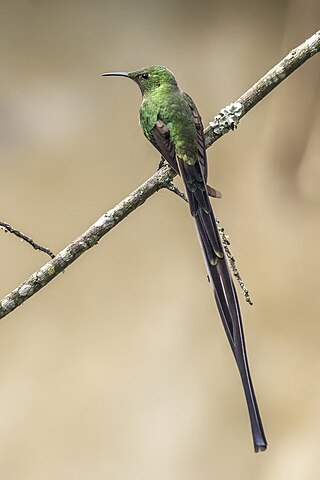
The black-tailed trainbearer is a species of hummingbird in the family Trochilidae. It is found between 2500 and 3800m in Colombia, Ecuador, and Peru. Its natural habitats are subtropical or tropical moist montane forest, subtropical or tropical high-altitude shrubland, and heavily degraded former forest.

Berlepsch's canastero is a Near Threatened species bird in the Furnariinae subfamily of the ovenbird family Furnariidae. It is endemic to Bolivia.
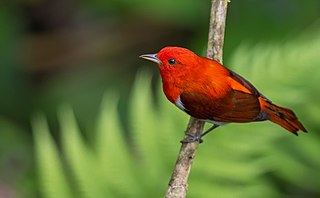
The scarlet-and-white tanager is a species of bird in the family Thraupidae. It is found in Colombia and northern Ecuador. Its natural habitats are subtropical or tropical moist lowland forests and heavily degraded former forest. The male is highly distinctive and has bright scarlet upperparts, darker red wings and undertail coverts, and white underparts with a scarlet median stripe running down the throat and belly. Females are patterned like the males, but are olive-brown instead of scarlet.
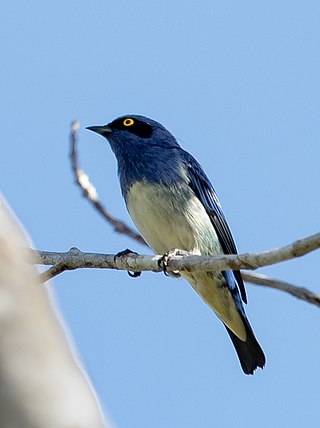
The white-bellied dacnis is a species of bird in the family Thraupidae. It is found in Brazil, Colombia, Ecuador, Peru, and Venezuela. Its natural habitat is subtropical or tropical moist lowland forests.

The yellow-bellied dacnis is a species of bird in the family Thraupidae, the Tanagers. It is found in Amazonian regions of Colombia, Ecuador, Peru, Bolivia and Brazil; also the eastern Orinoco River region of Venezuela. Its natural habitat is the canopy of tropical humid lowland forest.

The turquoise dacnis is a species of bird in the family Thraupidae. It is endemic to Colombia. It is a rather distinct species of dacnis, formerly separated in the monotypic genus Pseudodacnis.

The black-faced dacnis is a species of bird in the family Thraupidae. It is commonly found typically in pairs throughout the Amazon Rainforest.

The black-legged dacnis is a species of bird in the family Thraupidae. It is endemic to Brazil.

The viridian dacnis is a species of bird in the family Thraupidae. It is found in Colombia and Panama.

The Amazonian antpitta is a species of bird in the family Grallariidae. It is found in Bolivia, Brazil, and Peru. Its natural habitats are subtropical or tropical moist lowland forest and heavily degraded former forest.

The stub-tailed antbird is a species of bird in the family Thamnophilidae. It is found in Colombia and Ecuador. Its natural habitat is subtropical or tropical moist lowland forests.
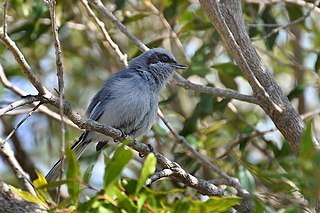
The masked gnatcatcher is a small songbird in the family Polioptilidae. It is found in Argentina, Bolivia, Brazil, Paraguay, and Uruguay.
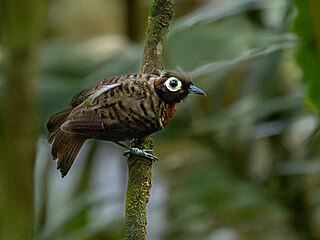
The harlequin antbird is a species of bird in the family Thamnophilidae. It is endemic to Brazil.
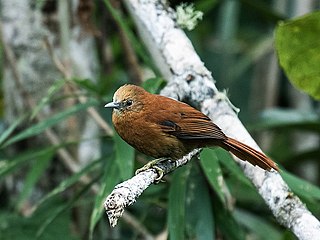
The russet-mantled softtail is a Near Threatened species of bird in the Furnariinae subfamily of the ovenbird family Furnariidae. It is endemic to northern Peru.

The Western Ecuador Moist Forests (NT0178), also known as the Pacific Forest of Ecuador, is an ecoregion in the plains and western foothills of the Andes of southern Colombia and Ecuador. At one time this region contained dense forests with highly diverse flora and fauna, and many endemic species. Most of the original habitat has now been destroyed, and the ecoregion is one of the most threatened in the world.






















